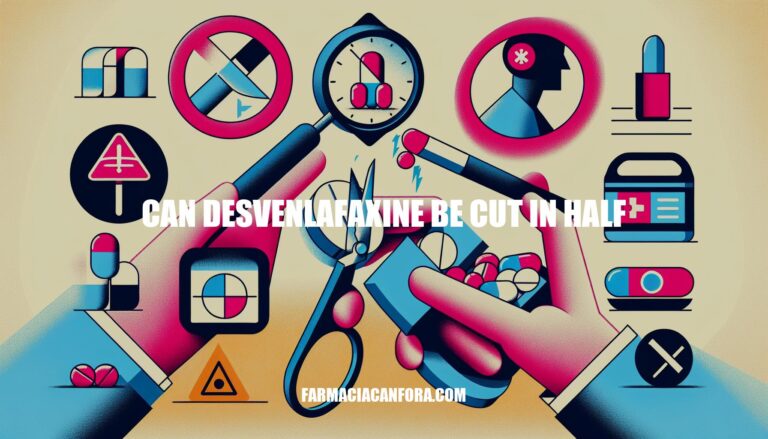


When considering whether desvenlafaxine, an antidepressant, can be cut in half, it’s crucial to understand the implications for medication administration. Desvenlafaxine tablets are often extended-release, meaning they are designed to release the medication slowly over time. Cutting these tablets can disrupt this mechanism, potentially leading to a rapid release of the drug, which may increase the risk of side effects and reduce efficacy. Proper medication administration ensures the drug works as intended, maintaining its safety and effectiveness. Always consult a healthcare provider before altering how you take your medication.
Desvenlafaxine tablets, such as Pristiq, should not be cut, crushed, or chewed. The tablets are designed to release the medication slowly over time, and altering them can affect the drug’s efficacy and lead to uneven distribution of the active ingredients.
Healthcare providers and pharmaceutical companies, including Pfizer, explicitly instruct that desvenlafaxine tablets must be swallowed whole with fluid. If you have any concerns about your dosage or how to take your medication, it’s best to consult your healthcare provider for personalized advice.
Desvenlafaxine is an antidepressant that belongs to the serotonin-norepinephrine reuptake inhibitor (SNRI) class. It works by increasing the levels of serotonin and norepinephrine in the brain, which helps improve mood and reduce symptoms of depression.
Cutting the tablet in half can affect its release mechanism and overall effectiveness because desvenlafaxine tablets are often designed as extended-release formulations. These formulations are engineered to release the medication slowly over time. When you cut the tablet, you disrupt this controlled release mechanism, potentially causing the medication to be released too quickly. This can lead to a spike in drug levels, increasing the risk of side effects, and a subsequent drop, reducing its effectiveness.
Cutting desvenlafaxine (Pristiq) in half can lead to several risks and side effects:
Altered Drug Absorption: Desvenlafaxine tablets are designed for extended release. Cutting them can disrupt this mechanism, leading to rapid release and absorption of the drug, which can cause spikes in blood levels.
Increased Side Effects: Rapid absorption can increase the risk of side effects such as nausea, dizziness, headache, and insomnia.
Reduced Efficacy: Inconsistent dosing can result in subtherapeutic levels, reducing the drug’s effectiveness in managing depression or anxiety.
Withdrawal Symptoms: Irregular dosing may lead to withdrawal symptoms like irritability, fatigue, and flu-like symptoms.
Potential for Overdose: If the cut tablet results in uneven doses, there is a risk of taking too much or too little of the medication.
It’s crucial to follow your healthcare provider’s instructions and not alter the medication without consulting them.
Many patients have shared their experiences with cutting desvenlafaxine (Pristiq) in half. Here are some common themes and concerns:
It’s crucial to follow medical advice and not make changes to your medication without professional guidance.
Desvenlafaxine tablets, such as Pristiq, should not be cut, crushed, or chewed. Cutting these tablets can disrupt the medication’s release mechanism, potentially leading to rapid absorption and increased side effects.
Proper medication administration ensures the drug works as intended, maintaining its safety and effectiveness. Always consult a healthcare provider before altering how you take your medication.
Desvenlafaxine is an antidepressant that belongs to the serotonin-norepinephrine reuptake inhibitor (SNRI) class, working by increasing serotonin and norepinephrine levels in the brain.
Cutting desvenlafaxine tablets can lead to several risks and side effects, including:
Patients who have cut their desvenlafaxine tablets report experiencing withdrawal symptoms, decreased effectiveness, and increased side effects.
It’s crucial to follow medical advice and not make changes to your medication without professional guidance. Consult a healthcare provider before making any changes to your medication regimen to avoid adverse effects.